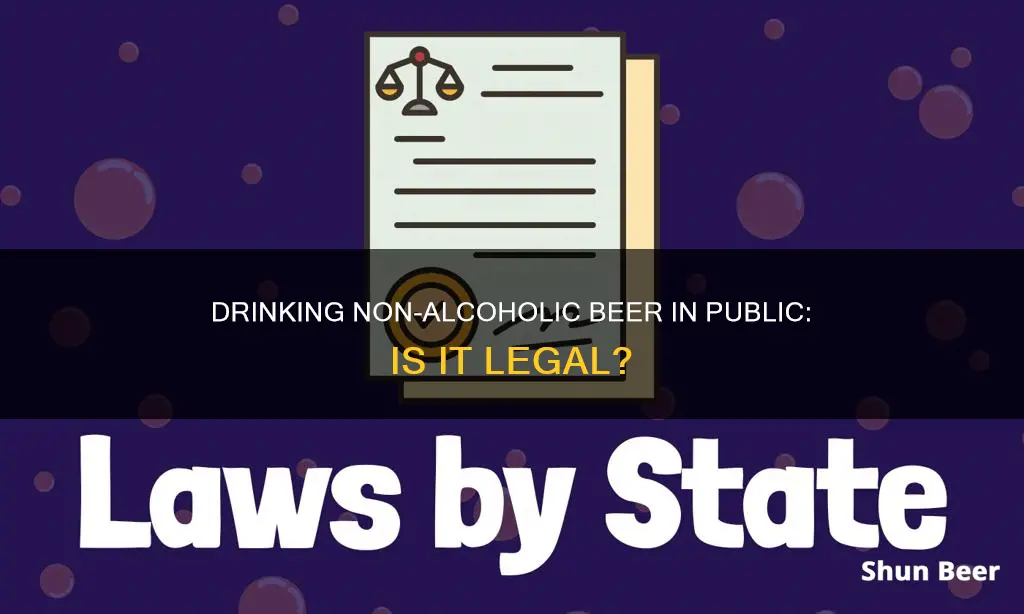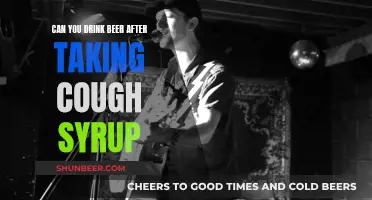
Drinking non-alcoholic beer in public is a topic that has sparked debate, especially with the rise in popularity of these beverages. While non-alcoholic beer is generally legal to consume in public, there are nuances to consider. In the US, federal law defines beer as containing at least 0.5% alcohol by volume, so beverages below this threshold are not technically considered beer and can be consumed by minors. However, some states have their own regulations, with a few prohibiting the drinking of non-alcoholic beer by minors. Additionally, drinking non-alcoholic beer while driving is not recommended due to potential legal complications and the risk of impaired judgment. The smell and taste of non-alcoholic beer may also trigger cravings for those recovering from alcohol use disorder. While it may be permissible to drink non-alcoholic beer at work, it could give an unprofessional impression and is generally discouraged. Ultimately, the acceptability of drinking non-alcoholic beer in public depends on societal perceptions and local laws.
| Characteristics | Values |
|---|---|
| Legality of drinking non-alcoholic beer in public | Generally legal, but depends on local laws |
| Intoxication | Non-alcoholic beer will not intoxicate you |
| DUI | You cannot get a DUI for drinking non-alcoholic beer |
| Open container laws | May apply, depending on the jurisdiction |
| Social perception | May be perceived as unprofessional or immature |
| Health risks | Non-alcoholic beer may pose health risks for pregnant people and recovering alcoholics |
What You'll Learn

Non-alcoholic beer and driving
Drinking non-alcoholic beer in public, especially while driving, is a topic of much discussion and debate. While non-alcoholic drinks are becoming increasingly popular, there are some important considerations to keep in mind.
First and foremost, it is essential to understand that non-alcoholic beer typically contains very little or no alcohol. It is made using fermentation, where yeast breaks down sugars, but it also undergoes an additional process called de-alcoholization to remove the alcohol. This results in a beverage that is low in calories and free from the impairing effects of alcohol on communication and interaction.
When it comes to driving with a non-alcoholic drink in your car, the situation becomes more complex. While technically, you can drink non-alcoholic beer while driving, it is generally advised against. This is because most US states do not distinguish between "alcoholic" and "non-alcoholic" drinks, and police officers will likely stop you if they see you drinking from a bottle that resembles a regular alcoholic beverage. This is particularly true if you are pulled over and found to have an open container in your vehicle, which is prohibited by open container laws. These laws are intended to reduce public intoxication and discourage drinking and driving, and they apply to private automobiles on the road.
It is important to note that you cannot be charged with a DUI for consuming true non-alcoholic beer, as these beverages contain no alcohol (0.0% ABV). However, if a police officer suspects that you are intoxicated, they have the discretion to arrest you. Additionally, drinking non-alcoholic beer while driving can still result in a DUI charge if your blood alcohol concentration (BAC) level is high enough, as some non-alcoholic beers can contain up to 0.5% ABV. Therefore, it is crucial to consume these beverages responsibly and avoid driving if you have consumed large quantities.
In conclusion, while non-alcoholic beer can be a refreshing and healthy alternative to alcoholic drinks, it is best to avoid drinking it in public, especially while driving. The potential consequences, including being pulled over by the police and the risk of a DUI charge, outweigh the benefits. It is always better to prioritize your safety and follow local laws and regulations regarding the consumption of non-alcoholic beverages in public spaces.
Enjoying Beer and Zoo Lights: What You Need to Know
You may want to see also

Non-alcoholic beer and relapse
Non-alcoholic beer is often marketed as a safe alternative for those looking to quit alcohol. Popular brands like O'Douls, Clausthaler, and Beck's N.A. are supposed to be safe to drink during recovery. These beverages are perfect for those who want to experience the sensation of drinking beer without consuming alcohol. However, it is important to note that non-alcoholic beer can contain up to 0.5% alcohol, and some studies have shown that even this small amount can trigger a relapse for those in recovery.
The Risks of Non-Alcoholic Beer
The main risk associated with non-alcoholic beer is its potential to trigger a relapse. While the amount of alcohol in these beverages is typically not enough to cause intoxication, other factors come into play. The smell and taste of non-alcoholic beer can activate the reward centre in the brain, releasing dopamine if a person has a strong association with alcohol. This can lead to a condition known as euphoric recall, where a recovering addict glamorizes their past drinking habits while ignoring the negative consequences.
Additionally, drinking non-alcoholic beer can serve as a behavioural crutch, providing a temporary solution that does not address the underlying issues or encourage the development of new, healthy habits. It is important for recovering addicts to establish new hobbies, friendships, and behaviours that do not revolve around drinking.
Making an Informed Decision
When considering whether to consume non-alcoholic beer during recovery, it is crucial to weigh the risks and benefits. While these beverages might help satisfy cravings and provide a sense of normalcy, they can also trigger strong urges and set the stage for a relapse. It is essential to be aware of your triggers and make informed decisions that support your long-term recovery goals.
Alternatives to Non-Alcoholic Beer
If you are concerned about the potential risks of non-alcoholic beer, there are other options to consider. At social gatherings, you can opt for water or soft drinks instead. Additionally, developing new hobbies and spending time with non-drinking friends can help you build a healthier lifestyle that supports your recovery journey.
In conclusion, while non-alcoholic beer may seem like a harmless alternative, it is important to recognize its potential impact on your recovery journey. Making informed decisions and seeking alternative options can help ensure that you maintain a sober and healthy lifestyle.
Beer and Milk: A Safe Combination?
You may want to see also

Non-alcoholic beer and pregnancy
Pregnancy is a time when expectant mothers prioritise their health and the well-being of their baby. It is widely accepted that consuming alcohol during pregnancy can pose serious risks to both the mother and the developing baby. As a result, many women seek alternatives to alcohol while still wanting to enjoy the taste of a refreshing beverage. Non-alcoholic beer has emerged as a popular option, but is it safe to consume during pregnancy?
Non-alcoholic beer is typically defined as beer with an alcohol-by-volume (ABV) content of less than 0.5%. While non-alcoholic beer is legally classified as such if it contains less than 0.5% ABV, it's important to note that even this small amount of alcohol can be present in the final product. Studies have shown that beverages labelled as non-alcoholic or alcohol-free can still contain trace amounts of alcohol, sometimes exceeding what is declared on the label.
Given these risks, leading organisations such as the American College of Obstetricians and Gynecologists (ACOG) and the Centers for Disease Control and Prevention (CDC) advise pregnant women to completely abstain from alcohol consumption. The potential impact of alcohol on fetal development is one of the primary reasons for this recommendation. Fetuses are unable to metabolise alcohol efficiently, which means that any alcohol consumed by the mother can pass through the placenta and directly affect the baby. This can lead to a range of developmental abnormalities collectively known as fetal alcohol syndrome (FAS).
While there are no studies directly evaluating the safety of consuming non-alcoholic beverages during pregnancy, there is evidence suggesting that these drinks may contain higher ethanol levels than indicated on their labels. A study by Motherisk found that 29% of the analysed beverages contained ethanol levels higher than declared, with some brands claiming to have 0.0% alcohol containing up to 1.8%. The extent of maternal and subsequent fetal exposure due to the ingestion of such levels is not yet fully understood.
To eliminate any potential risks associated with alcohol consumption during pregnancy, it is advisable to choose alcohol-free mocktails or drinks labelled as "alcohol-free" rather than non-alcoholic beer. By law, these products must contain no detectable alcohol, ensuring that there is no risk of exposure to even trace amounts of alcohol.
While it can be challenging to give up drinking altogether, it is important to remember that choosing a non-alcoholic lifestyle during pregnancy is a responsible and commendable decision. Social situations often revolve around alcohol, and giving it up can lead to feelings of isolation or missing out. However, there are plenty of alternative beverage options available, including alcohol-free mocktails, herbal teas, infused water, and fruit juices, which can provide a flavorful and satisfying experience without the presence of alcohol.
In conclusion, while non-alcoholic beer may seem like a tempting option during pregnancy, it is best to avoid it altogether. The potential risks associated with even trace amounts of alcohol make it advisable to prioritise the health and well-being of the baby by abstaining from alcohol completely. By choosing alternative beverage options and seeking support from healthcare professionals and fellow expectant mothers, women can make informed decisions that prioritise the health and development of their baby.
Beer and Tylenol: Safe Mix?
You may want to see also

Non-alcoholic beer and the workplace
The consumption of non-alcoholic beer in the workplace is a topic that has gained attention in recent years, especially as more people seek ways to reduce their alcohol intake. While it may not be illegal to drink non-alcoholic beverages at work, there are several factors and potential drawbacks to consider.
Legal Perspective
Consuming non-alcoholic drinks in the workplace is not illegal. However, the stance of the company and internal business policies play a crucial role. Many employers may deem it unacceptable due to the resemblance of non-alcoholic drinks to their alcoholic counterparts, which can give off the wrong impression to clients and coworkers.
Workplace Perception
The perception of drinking non-alcoholic beer at work varies depending on the industry and work environment. For example, drinking non-alcoholic beer in a brewery or a casual office might be more acceptable than in a school, hospital, or when operating an aircraft or performing surgery.
Health and Safety
Non-alcoholic beer often contains trace amounts of alcohol, which may be a concern for recovering alcoholics or individuals with liver impairments. Additionally, the smell and taste of non-alcoholic beer can trigger cravings and relapse for those with alcohol use disorder. It is also important to note that non-alcoholic beer is typically carbonated, which can cause bloating and cramping, and may not be suitable for consumption during work hours.
Professionalism
Drinking non-alcoholic beer at work can give the impression that you are trying to mimic drinking alcoholic beer, which may be perceived as unprofessional or immature by colleagues and supervisors.
In conclusion, while there is no legal restriction on consuming non-alcoholic beer in the workplace, it is generally advisable to avoid it due to potential health risks, professionalism, and the perception it may create in certain work environments. Each company and industry will have its own stance and policies on this matter, so it is essential to refer to internal guidelines and use discretion when making a decision.
Beer and Diabetes: Is It Safe to Drink?
You may want to see also

Non-alcoholic beer and minors
The laws surrounding minors and non-alcoholic beer vary across different states in the US. While the National Minimum Drinking Age (NMDA) Act of 1984 prohibits the sale of alcoholic beverages to anyone under the age of 21, non-alcoholic drinks are not specifically addressed in the legislation. This has led to a complex legal situation where some states treat non-alcoholic drinks as completely distinct from alcoholic beverages, while others maintain stricter controls.
In general, minors under the age of 21 can consume non-alcoholic beverages, even those with less than 0.5% ABV. These drinks are not considered "beer" as per the NMDA Act, which defines "beer" as any beverage containing more than 0.5% ABV. Thus, NA beer is legally consumable by minors, at least at the federal level. However, this does not mean that minors can purchase these drinks, as the laws surrounding the sale of non-alcoholic drinks to minors vary by state.
According to a roundup of state laws by One Club Sober, three states—Mississippi, North Dakota, and Ohio—only allow the drinking of non-alcoholic beer for those aged 18 and older. Additionally, 14 states prohibit minors from drinking non-alcoholic beer altogether. For example, Kansas prohibits the consumption of any "cereal malt beverage" that has undergone fermentation, which would include most non-alcoholic beers.
In terms of purchasing non-alcoholic beer, 17 states bar the purchase by those under 21, while in Ohio, the minimum age is 18. However, a general rule of thumb is that if a state allows minors to consume non-alcoholic beer, it also permits them to buy it. Nevertheless, the comfort level of a minor walking into a store to purchase such drinks is another question.
The laws surrounding minors and non-alcoholic drinks are complex and vary by state. As such, it is essential for parents and guardians to research their local and state laws before allowing their children to consume these beverages. While non-alcoholic drinks may be a safer alternative to conventional beer, the potential impact on minors' future consumption patterns is still not fully understood.
Beer and Meloxicam: Safe Mix or Health Risk?
You may want to see also
Frequently asked questions
Yes, non-alcoholic beer is perfectly legal to drink in public. However, it's important to check your local laws as there may be variations between different locations.
While it is technically legal to drink non-alcoholic beer while driving, it is not recommended due to the risk of being pulled over by the police and the potential for distraction.
In general, minors under the age of 21 can consume non-alcoholic beverages. However, there are variations in state laws, with some states only allowing non-alcoholic beer consumption for those 18 and older, and others prohibiting it entirely for minors.
While it may not be against the rules, drinking non-alcoholic beer at work can give a negative impression to colleagues and clients. It's best to check your workplace policies before consuming non-alcoholic drinks during work hours.







